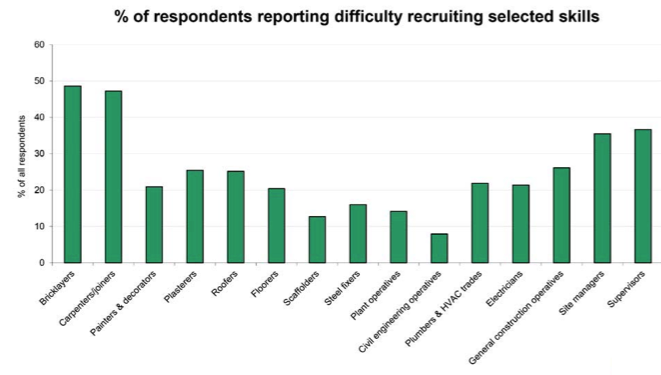

New findings have suggested that skills shortages currently gripping the construction industry are likely to become more intense in the next three months as workloads increase.
According to the latest State of Trade survey from the Federation of Master Builders (FMB), small and medium sized firms are forecasting rising activity levels following continued increases in the three months to June 2015. Over a third (37%) of firms are projecting higher workloads, with only 29% of businesses indicating that their staffing levels may increase over the next six months.
Brian Berry, chief executive of the FMB, said: “There can be no doubt that the building industry is booming but the skills shortage continues to loom large over our industry. Looking ahead, our members are reporting that their workloads are likely to rise over the coming three months, which means the shortage of skilled workers will only become more acute.
“It also begs the question, how much stronger would the pace of growth in the UK construction industry be if we had an ample supply of skilled tradespeople?”
The issue of skills shortages has dogged the construction industry for several months, with the FMB’s latest survey showing around a quarter of businesses are struggling to recruit roofers, with almost 40% reporting difficulty recruiting site managers and supervisors.
A recent report published by the Construction Industry Training Board suggested that 224,000 more jobs will need to be filled in the construction industry by 2019. It added: “Government has an important role to play, particularly in helping the industry to plan ahead.”
The Government has announced plans to implement an apprenticeship levy on larger firms to try and create the three million apprenticeships it pledged in the Conservative Party manifesto. As a result, there has been some confusion within the construction industry, which already has an apprenticeship levy imposed by the CITB.
Mr. Berry said: “The Government is determined to increase the number of apprentices being trained by our industry over the coming five years but the recent announcement on the new levy has led to more questions than answers. The Budget Statement said that “the levy will support all post-16 apprenticeships in England” and if this also includes the construction industry, the assumption is that the CITB levy will not continue.
“However, we are still unclear regarding the details surrounding this new alternative cross-industry levy. If the levy on large employers is only used to fund apprenticeship training by large employers, how will apprenticeship training by small firms be dealt with? Given that two-thirds of all construction apprentices are trained by micro firms, it’s vital that we have a system in place that drives high levels of apprenticeship training through companies of every size.
“We are keen to work closely with the Government over the coming weeks – the stakes couldn’t be higher so we must get this right.”




